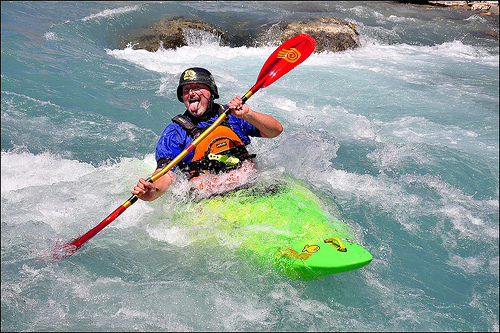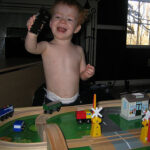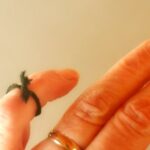The best way to predict the future is to create it. – Peter Drucker

Is this too easy or too hard? If you don’t know, you’ll find out soon enough. Observe, adjust the plan, and continue. That’s how you predict, and how you create the future.
What does that mean?
The Future… Kind of scary sounding. Full of unknowns. Full of twists and turns. How can you possibly predict it? This quote says that the best way to know what is coming is to be an active participant.
By creating your future, you are an active player in the events as they unfold. By knowing what you want, and what you are willing to do to get them, you can help to shape what the future holds.
Think of two people in a river. One is just floating on a raft, unable to predict what is coming, because they aren’t looking around and aren’t doing anything to move or steer. The other person is in a kayak, looking for the path they want, and actively steering and moving themselves to that point.
Which one is predicting the future by inventing it? Which is more likely to be surprised at where they end up? Yes, there are times to relax, but there are also times to paddle like crazy.
Why is creating your future important?
Not everyone will have the impact on the globe as Bill Gates or Steve Jobs (to pick a pair of computer guys). But we all can have that level of impact on our own lives. But before we can predict our own future, before we can create it, we have to know our own lives, and who we are.
By coming up with ideas about what we want to do, we begin to plan. As we plan, we begin to take actions. As we take actions, we begin to create our future. It really is that simple. We’re creating our future right now. It’s just a default future, a “whatever” future, until we take charge, right.
We all have the opportunity to create our own future. The question is what will that future be? What do we want? If we don’t work for that dream, for that future which we want to happen, what will we get instead? Yes, it will take effort. No, it won’t always be fun. But what do you want out of life?
Where can I apply this in my life?
Your past is your foundation. If it’s shaky or you don’t like it, you will have to shore it up or rebuild it. But if you don’t know your past, either because you’ve tried to forget it or because you’ve lied to yourself so many times you believe it, how will you know what your past is?
Self-knowledge is the best way to where you are at now, and what your past has been. Together, they make your launch pad for the future. As you learn more about yourself, you may find that you have some back-filling to do in order to have a stable launch pad.
Once the foundation is good, you may find that it isn’t in the best place. Do you work on moving the launch site, or do you take a first few steps from where you are? That’s something you will have to weigh the options and then come to a conclusion.
Going back to the kayak analogy, you first have to check your equipment. That’s your past, and it will have an impact on what you do. Is it made of durable plastic, or is it old-school with natural materials? How water tight is it and what is the buoyancy like?
Now, what are your skills? Can you do an Eskimo Roll? How confident are you? Are you padding? What about flotation? Helmet? Are you ready for a little white water, or do you thrive on Class V and up? You know your abilities (present), and now you can start looking at what lies ahead.
Life is a largely uncharted river. You may have heard something about rocks after the third bend, but how difficult are they? Knowing your equipment and your skills, you can start taking control. You decide when to paddle forwards and when to back up. You decide what line to take and when to get out and portage (carry the boat).
In life, like on the river, you have to rely on your ability to plan with the knowledge you have. You have to execute that plan to the best of your ability. You have to be able to notice what is going on. You have to be able to adjust your plan. And then you repeat. And repeat.
You don’t go kayaking by just putting your paddle in once and pushing once, right? You won’t go very far in life if that is how you plan to do things, will you? The only question now is what does the future hold for you? It’s up to you to provide your input into the future.
Even if all seems hopeless, you will likely still have control of some of the smaller details. Start there, and work your way larger. As you get better at this, your launch pad will slowly move to better ground. But you need to know what you want, and where you are going. Anywhere but here is not a destination.
From: Twitter, @tonyrobbins
confirmed at : http://www.brainyquote.com/quotes/quotes/p/peterdruck131600.html
Photo by s.schmitz
Note: This quote, in minor variations, is also attributed to Alan Kay and quite a few others. See Quote Investigator for details.







Pingback: The best way to predict the future is to create it. 12 reasons why
Pingback: “The best way to predict the future is to create it” | Outrun Change